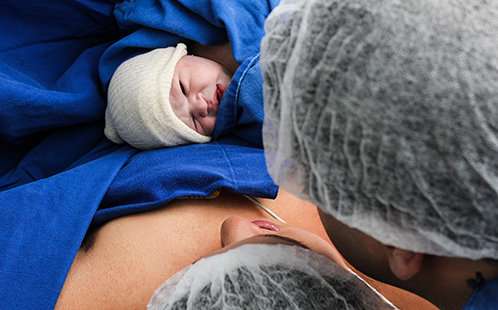World-first study links birth interventions and long-term childhood illness

A team of leading international researchers have found significant links between medical interventions used in the birthing process – such as caesarean section and induction – and a child's long-term health.
Western Sydney University collaborated with University Medical Center Groningen and VU Medical Center (Amsterdam), Flinders University (South Australia), UCLAN University (UK), Sydney University and the University College Cork (Ireland) on the landmark study.
Researchers analysed linked population and health data, pertaining to 491,590 healthy women and their children born in New South Wales from 2000-2008. The children's health was then followed during their first 28 days of life, and up to 5 years of age, until 2013.
The findings, published today in Birth,(opens in new window) include:
- Infants who experienced an instrumental birth following induction or augmentation had the highest risk of jaundice and feeding problems.
- Infants born by caesarean section had higher rates of hypothermia following birth.
- Children born by emergency caesarean section had the highest rates of metabolic disorders in later years.
- Odds of respiratory infections, metabolic disorder and eczema were highest amongst children who experienced any form of birth intervention.
Professor Hannah Dahlen, from Western Sydney University's School of Nursing and Midwifery, says the aim of the study was to examine the association between operative (e.g. cesarean section) and medical (induction or augmentation of labour) birth interventions on a child's health in the first 28 days and first five years after birth.
"Across the board, the results indicate that the odds of a child developing a short or longer term health problem significantly increase if there was a medical intervention at the time of their birth," says Professor Dahlen.
"The study adds to the mounting scientific evidence which suggests that children born by spontaneous vaginal birth, without commonly used medical and surgical intervention, have fewer health problems."
Dr. Lillian Peters – who works as an epidemiologist at two Dutch universities (University Medical Center Groningen and VU Medical Center Amsterdam) and the Midwifery Academy Amsterdam Groningen – was a visiting postdoctoral fellow at Western Sydney University when she led the data analysis.
Dr. Peters says the study has demonstrated that children born by caesarean section are more susceptible to a range of adverse health outcomes.
"What we have done in this study – which is unique – is look at the use of hormones to start and stimulate labour as well as mode of birth," says Dr. Peters.
"The results showed that infants born by instrumental birth following induction or augmentation were more likely to experience jaundice, while children born by caesarean section were at increased risk of developing longer term adverse health outcomes such as respiratory infections and metabolic disorder (i.e. diabetes, obesity).
"With our international team we will conduct future research to, hopefully, confirm or our findings by including other population-based data registries including a longer follow-up period for a wider range of adverse child health outcomes, particularly those that are found more commonly beyond 5 years of age."
As part of the world-first study, NSW birth records were used to select a sample of 'healthy' mothers, without any pre-existing or pregnancy related health conditions. Women were only included in the study if they did not smoke or take drugs; were within the age range of 20-35 years; and gave birth at 37-41 weeks of gestation to a single baby within a normal weight range.
After applying all exclusion criteria, the final study cohort consisted of 491,590 low risk pregnant women. The majority were Australian born (69 percent) and had a mean age of 29 years. Fifty five percent of the women were having their first child.
A wide range of births were analysed:
- 88 per cent of women received pain medication during labour;
- 43 per cent were induced prior to labour, or received augmentation during labour;
- 38 per cent had a spontaneous vaginal birth, without medical intervention;
- 11 per cent had an elective caesarean section;
- 7 per cent had an emergency caesarean section after an induction or augmentation.
Professor Dahlen along with an international team of researchers developed the Epigenetic Impact in Childbirth (EPIIC) hypothesis in 2012 – which they now continue to develop and test.
Professor Dahlen says the EPIIC hypothesis proposes that vaginal birth provides an important opportunity to seed a healthy microbiome and the stress of normal physiological labour provides an important influence on epigenetic modulation.
"There is a general understanding that medical interventions may interrupt the normal stress of being born and seeding of a healthy microbiome and this can lead to a wide range of diverse health outcomes," says Professor Dahlen.
"Too little stress (i.e. no labour and caesarean section) and too much stress (induced/augmented labour and instrumental birth) can both have a negative impact."
Professor Dahlen suggests that, by improving continuous support – or continuity of midwifery care – and introducing a more evidence-based approach to care in labour, the rates of physiological birth can improve and health outcomes will improve for all.
"It is important that women and their partners have all the information about both short and long-term effects of intervention in order to make truly informed decisions about care," she says.
More information: Lilian L. Peters et al. The effect of medical and operative birth interventions on child health outcomes in the first 28 days and up to 5 years of age: A linked data population-based cohort study, Birth (2018). DOI: 10.1111/birt.12348



















